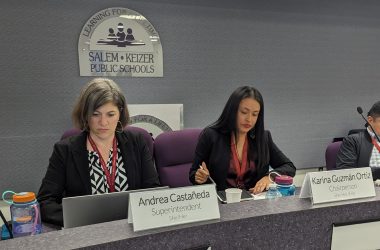
Students at Hallman Elementary School gather for a morning assembly. (Fred Joe/Special to Salem Reporter)
Superintendent Christy Perry knows her first step if her district gets more money: hire a mental health counselors for each of Salem-Keizer’s six high schools.
She is one step closer to that ambition Tuesday after a legislative committee gave crucial approval to the Student Success Act, which would create a $1 billion fund for improvements at K-12 schools.
With that funding increase, Perry expects the Salem-Keizer School District would receive an extra $34 million a year the next two years.
That’s nearly enough money to add one counselor and four teachers at each of the district’s 65 schools.
Across the district, high school counselors juggle many responsibilities for hundreds of students, including academic advising, help with college or career pathways, mental health support and suicide risk evaluations.
At McNary High School, principal Erik Jespersen said his four counselors often have backlogs of suicide risk assessments because they’re each responsible for about 500 students.
Those assessments get prioritized based on need, and students who are talking about harming themselves or have a plan aren’t left waiting, he said. But that means less time for other work, including helping kids struggling just to stay engaged in school.
“They work extremely hard, they’re very efficient with their time but if you have a kid go in there, they’re in crisis, that’s a four-, five-, six-hour process,” Jespersen said.
The legislation, which passed a House committee Monday night, would allow districts to beef up spending on several broad areas, including student health and safety, lowering class sizes, more instructional hours and a well-rounded curriculum, which could include core subjects like reading as well as arts.
It’s drawn support from educators around Oregon, though many businesses oppose the new corporate tax that would pay for new education spending.
Jim Green, executive director of the Oregon School Boards Association, and a school board member for Salem-Keizer, said that level of funding would make a huge difference for students across Oregon.
“We know what we need to do. We just don’t have the resources to do it,” he said.
Perry has spoken to legislators and testified when asked by the Confederation of Oregon School Administrators, she said. She feels her best advocacy is explaining to legislators, school board members and the public what it would mean for local students.
Perry has worked with a group of district staff and educators to come up with four plans for spending the funds, though she said they remain rough outlines.
That’s partially because she didn’t want educators to put hours into detailed plans for spending money that might not materialize, she said.
“I want to engage them enough to be helpful but not so much … they’re so discouraged if it doesn’t pass,” she said.
Perry wants to hire mental health counselors to focus on students’ social and emotional wellbeing, rather than sharing guidance and advising duties.
Beyond that, district plans are in no priority order. Some items on the wish list Perry and staff have developed would target specific groups of students: more behavioral specialists in elementary schools, and career and technical education programs for middle school students.
Perry has also contemplated hiring more mentors to work specifically with black, Native American and Pacific Islander students, the three ethnic groups with the lowest graduation rates in the district.
But she’d like to see some across-the-board help for students, such as reductions in class size through hiring more teachers, and possibly an extended school year.
“More learning time for all kids would be a good thing,” she said.
It’s unclear how much of the new funding would be consumed by the district’s growing pension costs.
The district’s rough budget for next year, which assumed no additional funding from the Student Success Act, would dedicate $85 million to Public Employee Retirement System obligations, a $14 million increase over this year.
Perry said she hasn’t yet done the math for any additional funds.
At McNary, Jespersen said he’d most like to extra staff to help students in core classes, particularly ninth grade math, which is often a stumbling block to graduation.
“It doesn’t take too much diving into the data to realize student success is paramount, particularly at the freshman level,” Jespersen said.
When students do well in early math and English classes, they tend to stay on track and graduate on time. When they fail those classes, they can grow discouraged and drop out.
McNary has a graduation coach who works to get kids who have dropped out back in school. With more staff, Jespersen said he could lower class size for those key subjects, making sure students get more individual attention, or have more adults who work to help struggling kids before they get to the point of dropping out.
“This is an investment on our future. We have to do a great job of preparing our kids because at the high school level it’s the last stop. We need to be producing high school graduates with a plan for college, for trade schools, for some type of training or to go right into the workforce,” he said. “Our community relies on that and we take that very seriously.”
Reporter Rachel Alexander: [email protected] or 503-575-1241.
Follow Salem Reporter on FACEBOOK and on TWITTER.
YOUR SUBSCRIPTION WOULD HELP — Salem Reporter relies almost exclusively on reader subscriptions to fund its operations. For $10 a month, you hire our entire news team to work for you all month digging out the news of Salem and state government. You get breaking news alerts, emailed newsletters and around-the-clock access to our stories. We depend on subscribers to pay for in-depth, accurate news. Help us grow and get better with your subscription. Sign up HERE.

Rachel Alexander is Salem Reporter’s managing editor. She joined Salem Reporter when it was founded in 2018 and covers city news, education, nonprofits and a little bit of everything else. She’s been a journalist in Oregon and Washington for a decade. Outside of work, she’s a skater and board member with Salem’s Cherry City Roller Derby and can often be found with her nose buried in a book.









